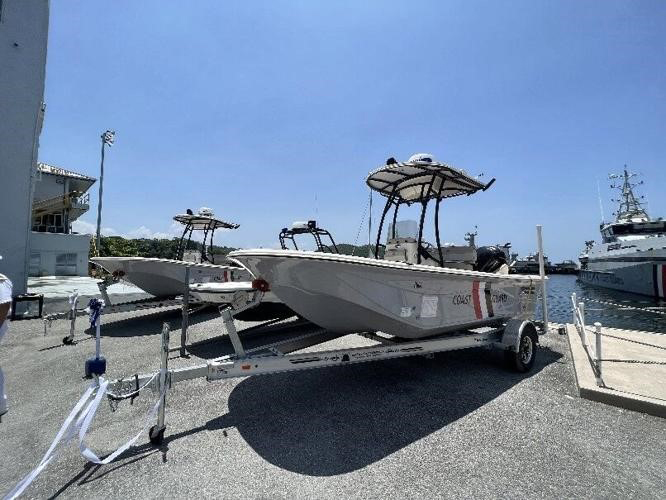(Trinidad Express) National Security Minister Fitzgerald Hinds has admitted that Trinidad and Tobago has “limited capacity” to protect its borders from illegal drugs and guns.
Hinds was speaking yesterday at a handing-over ceremony of a donation by the United States government of four naval assets to the Trinidad and Tobago Coast Guard as well as the upgrading of its Maritime Operations Command Centre.
US ambassador Candace Bond also delivered remarks.
The assets and upgrade cost approximately US$1.6 million.
The ceremony took place at the Coast Guard Headquarters, Staubles Bay, Chaguaramas.
Before the handover, Hinds spoke about Trinidad and Tobago’s border management.
“The Chief of Defence Staff, (Air Vice Marshall Darryl Daniel) and the Commissioner of Police, (Erla Harewood-Christopher) and others involved in the protection of the people of Trinidad and Tobago would have indicated to me that we do have some riverine inlets that are used by those who perpetrate these incursions into our space,” he said. “The Coast Guard had identified several inlets around Trinidad that are used by smugglers to import both narcotics such as cocaine, and guns.”
He said the donation of the shallow draft riverine vessels would allow the Coast Guard to pursue smugglers even if they try to enter the island through its rivers.
“We do have capacity but I would say limited capacity,” Hinds noted. “This donation wouldn’t take us a hundred per cent.
He said while the country’s naval capacity was not 100 per cent, yesterday’s donation of the shallow draft naval vessels “will certainly put us in a far better position and for that we are more than grateful”.
Hinds also acknowledged the relationship between Trinidad and Tobago and the United States.
He and Ambassador Bond agreed that transnational threats can only be combatted through bilateral collaboration.
“Today’s handover is a timely one as countries across the world face threats to border security brought on by transnational criminal activity, including the trafficking of guns ammunition, narcotics and people,” Hinds said.
He said the Defence Force “stands to benefit, very directly and very significantly from the upgrade of the maritime operations command centre.
“This newly refurbished and modernised centre allows the Defence Force to more effectively monitor vessels, track vessel traffic more effectively and to integrate the use of geospatial mapping technology and to streamline operational processes,” he said.
He stated that this would “lead to increased maritime domain, awareness and more effective command and control”.
“This is done by integrating data and information from a range of sources including radar, our automatic identification system and satellite imagery through multiple applications.
Ambassador Bond said the “challenges that we confront to dismantle illegal networks serves as a reminder that it takes a network to defeat a network, a single organisation cannot tackle the problem alone”.
“Illicit trafficking of drugs, firearms and people is one such a challenge, and combating this challenge is an issue of grave concern for both of our countries and the entire region. The goal of strengthening maritime domain awareness is important for the security of our hemisphere,” she said.






